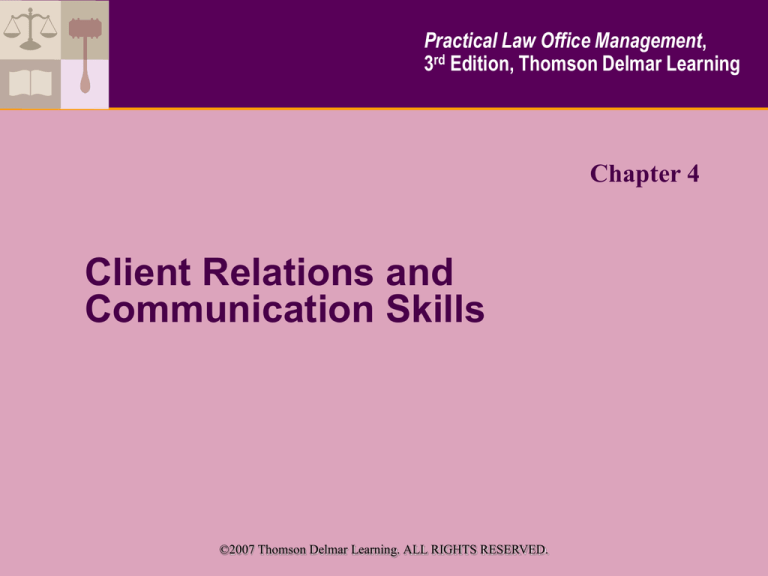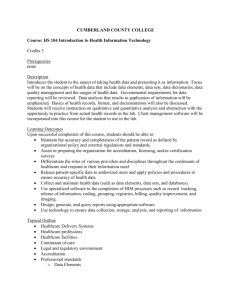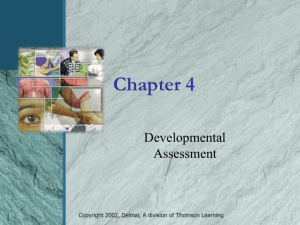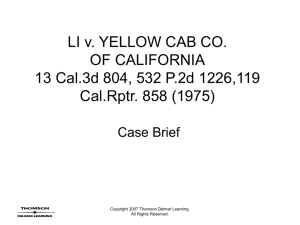
Practical Law Office Management,
3rd Edition, Thomson Delmar Learning
Chapter 4
Client Relations and
Communication Skills
©2007 Thomson Delmar Learning. ALL RIGHTS RESERVED.
Attorneys’ Ethical Duty to
Communicate with Clients
Model Rules of Professional Conduct Rule 1.4 Communication
a) A lawyer shall:
(1) Promptly inform the client of any decision or circumstance with
respect to which the client’s informed consent, as defined in rule
1.0(e), is required by these rules;
(2) Reasonably consult with the client about the means by which the
client’s objectives are to be accomplished;
(3) Keep the client reasonably informed about the status of the matter;
(4) Promptly comply with reasonable requests for information; and
(5) Consult with the client about any relevant limitation on the lawyer’s
conduct when the lawyer knows that the client expects assistance
not permitted by the rules of professional conduct or other law.
(B) A lawyer shall explain a matter to the extent reasonably necessary to
permit the client to make informed decisions regarding the
representation.
2
©2007 Thomson Delmar Learning. ALL RIGHTS RESERVED.
Attorneys’ Ethical Duty to
Communicate with Clients
Generally an attorney must:
• Inform a client on the status of his or her case.
• Timely respond to a client’s request for information.
• Inform clients promptly about important information.
• Not cover up a matter if he or she failed to carry out
the client’s instructions.
• Notify a client if the attorney is leaving a firm or
quitting the practice of law.
• Notify a client if he or she is stopping work on a
client’s case.
• Explain the law, and benefits and risks of alternative
courses of action.
• Notify and communicate settlement offers to clients.
3
©2007 Thomson Delmar Learning. ALL RIGHTS RESERVED.
Client Relationships
Ways to foster positive client relationships:
• Treat each client as if he or she were your only client.
• Send copies of all documents produced for the client’s
case to the client.
• Do not use legalese.
• Return client phone calls immediately.
• Be courteous, empathetic, and professional at all
times.
• Respond to client requests in a timely fashion, and
keep your promises.
4
©2007 Thomson Delmar Learning. ALL RIGHTS RESERVED.
Client Relationships
Ways to foster positive client relationships:
• Give clients routine, periodic status reports on
their cases.
• Do not share personal or office problems with
clients.
• Preserve client confidences.
• Use client surveys to gain insight into client
needs.
• Publish a client manual.
• Take conflicts seriously, and be ethical.
• Do not procrastinate.
5
©2007 Thomson Delmar Learning. ALL RIGHTS RESERVED.
Client Relationships
What Clients Like
What Clients Dislike
Friendliness
Being talked down to
Competence
Arrogance
Promptness
Staff acting bored or uninterested
Being able to reach attorneys/
staff on the first try
Impatience
Excellent follow-up
Rudeness
Not being billed for every
two-minute phone call
Calls and e-mails not returned
Attorneys/staff taking extra time
to explain the legal process in
layperson’s terms
Incorrect billings
6
©2007 Thomson Delmar Learning. ALL RIGHTS RESERVED.
Client Relationships
What Clients Like
What Clients Dislike
Listening and paying attention to
what the client has to say
Being forgotten, treated as unimportant,
or taken for granted
Demonstrating genuine interest in
the client’s problems and concerns
year in and year out
Confidentiality breaches
Honesty
Errors
Good financial stewardship
Poor-quality work
Completing work on time
Multiple staff billing for the same event
Waiting in the waiting room when they
have an appointment and are on time
7
©2007 Thomson Delmar Learning. ALL RIGHTS RESERVED.
Client Relationships –
Know Your Client
•
When dealing with the client, take into account his or
her emotional/mental/physical state.
• Establish basic trust in the relationship at every
opportunity by listening to their needs, being honest,
and being respectful.
• Ask your clients what their concerns are about the
matter.
• Ask your clients what their businesses are about.
• Do research on your own about their businesses and
industries.
• Ask how they prefer to be communicated with (in
person, e-mail, telephone, voice mail, etc.)
• Ask them how often they want to be communicated with.
• Ask how you can serve them better periodically.
8
©2007 Thomson Delmar Learning. ALL RIGHTS RESERVED.
Client Relationships – Treat Each
Client as if He or She Is Your Only
Client
•
•
•
•
•
When you meet with a client, only have his or her file on
your desk.
Never take another call when meeting with a client, and
let others know not to disturb you.
Never talk about how busy you are or about other cases
to clients.
Particularly with new clients, it is important that the initial
meeting go well and that law office staff are immediately
available after a referral is made.
Particularly with new clients, be sure and mention
whether the firm has handled similar cases in the past.
Clients like to know the firm is experienced regarding
the subject matter of their case.
9
©2007 Thomson Delmar Learning. ALL RIGHTS RESERVED.
Client Relationships
•
•
•
•
•
•
•
•
•
Send copies of all documents to clients.
Do not use legalese.
Return all phone calls, and reply to e-mails and
voice mails immediately.
Be courteous and professional.
Respond to clients requests, and keep promises.
Give periodic updates.
Never share personal problems or complain to
clients.
Preserve client confidences.
Survey clients.
10
©2007 Thomson Delmar Learning. ALL RIGHTS RESERVED.
Client Relationships
•
Management must help promote good client
relations.
• Publish a client manual.
• Take conflicts of interests seriously, and be
ethical.
• Do not procrastinate.
11
©2007 Thomson Delmar Learning. ALL RIGHTS RESERVED.
Client Relationships – Resolving
Client Dissatisfaction
Strategies for resolving client dissatisfaction:
• Empathetically listen to the complaint; do not
interrupt, and do not argue.
• Do not overstep your bounds or promise
something you cannot deliver.
• Take notes.
• Forward complaints to your supervising attorney,
and be honest.
• Do not ignore the complaint.
• Realize that some clients will always complain.
• Realize that you may have personality conflicts
with some clients.
12
©2007 Thomson Delmar Learning. ALL RIGHTS RESERVED.
Client Relationships Technology
Clients are demanding greater use of technology to
serve them.
• E-mail
• E-mail attachments (particularly Microsoft Office
products, since this is what many corporations and
individuals use)
• Extranet
• Attorneys’ and legal professionals’ mobile phone
numbers
• Electronic billing
13
©2007 Thomson Delmar Learning. ALL RIGHTS RESERVED.
Client Relationships –
Why Do Clients Leave?
Why Clients Leave Law Offices
Percent
Death
1%
Move
3%
Dislike the product
5%
Have a dispute that is not addressed or corrected
24%
Feel they were treated discourteously, indifferently,
or were simply not given good service
67%
14
©2007 Thomson Delmar Learning. ALL RIGHTS RESERVED.
Client Relationships –
Difficult Clients
•
Stay calm and maintain professionalism.
Document conversations.
Be courteous, but maintain an arm’s-length
relationship.
Keep the attorney fully informed.
•
•
•
15
©2007 Thomson Delmar Learning. ALL RIGHTS RESERVED.
Improving
Communication Skills
•
Listen.
• Consider your nonverbal signals, such as how you are
dressed, whether or not you are fidgeting, or if you have
your hands in your pockets.
• Do not become emotional.
• Make eye contact.
• Be precise and clear, so nothing is left to the imagination.
• Tailor the content of your communication for your
audience.
• Consider the timing and context of your communication.
• Do not be judgmental/avoid negatives.
• Ask questions.
• Rephrase things.
16
©2007 Thomson Delmar Learning. ALL RIGHTS RESERVED.
10 Commandments of
Good Listening
1. STOP TALKING!
•
You cannot listen if you are talking.
2. PUT THE TALKER AT EASE.
•
Help the person feel that he or she is free to talk.
3. SHOW THE INDIVIDUAL THAT YOU WANT TO LISTEN.
•
Look and act interested. Do not read your e-mail while the
person talks. Listen to understand, rather than to oppose.
4. REMOVE DISTRACTIONS.
•
Do not doodle, tap, or shuffle papers.
5. EMPATHIZE WITH THE PERSON.
•
17
Try to see the other person’s point of view.
©2007 Thomson Delmar Learning. ALL RIGHTS RESERVED.
10 Commandments of
Good Listening
6. BE PATIENT.
•
Allow plenty of time. Do not interrupt. Don’t start for the door or walk
away.
7. HOLD YOUR TEMPER.
•
An angry person gets the wrong meaning from words.
8. GO EASY ON ARGUMENT AND CRITICISM.
•
This puts the person on the defensive. He or she may “clam up” or get
angry. Do not argue: even if you win, you lose.
9. ASK QUESTIONS.
•
This encourages the speaker and shows that you are listening. It also
helps to develop points further.
10. STOP TALKING!
•SOURCE:
18
Davis, K. (1972). Human behavior at work (4th ed.). ©1972, McGraw-Hill. Reprinted with permission of McGraw-Hill.
©2007 Thomson Delmar Learning. ALL RIGHTS RESERVED.
Traits of a Leader
•
Be an expert on what you are talking about. People
around you will develop confidence in your abilities
and rely upon your judgment and knowledge.
• Be honest. Develop a reputation for honesty and
integrity.
• Stay calm. Good leaders stay calm under fire.
• Trust and support subordinates.
• Take risks, and do not be afraid to fail.
• Encourage honest opinions from others.
• Set goals and visions.
• Be respectful.
19
©2007 Thomson Delmar Learning. ALL RIGHTS RESERVED.
Advantages of Group
Communication
•
Groups tend to make more accurate
decisions, since they have a greater
perspective.
• When a group makes a decision, it can be
implemented easier than if made alone.
• Group members can explain the group’s
decision, since they were included in the
process.
20
©2007 Thomson Delmar Learning. ALL RIGHTS RESERVED.
Disadvantages of Group
Communication
•
•
•
•
•
21
Decisions made by groups take up to 50%
longer than decisions made by individuals.
Group decisions are often compromises rather
than the most appropriate option.
“Groupthink” can occur. Groupthink is where
group cohesiveness and consensus becomes
stronger than the desire for the best possible
decision.
Groups sometimes make more risky decisions
than individuals.
Groups can be dominated by one or more
individuals.
©2007 Thomson Delmar Learning. ALL RIGHTS RESERVED.
Interviewing
•
•
•
•
•
•
•
•
•
•
•
Prepare for the interview.
Break the ice.
Always inform the person you are interviewing that you are a
legal assistant.
Listen carefully.
Communicate sincerity.
Be empathetic.
Organize the information.
Ask questions.
Do not be judgmental.
Never say “You have a great case.”
Leave fee discussions to the attorney.
22
©2007 Thomson Delmar Learning. ALL RIGHTS RESERVED.







